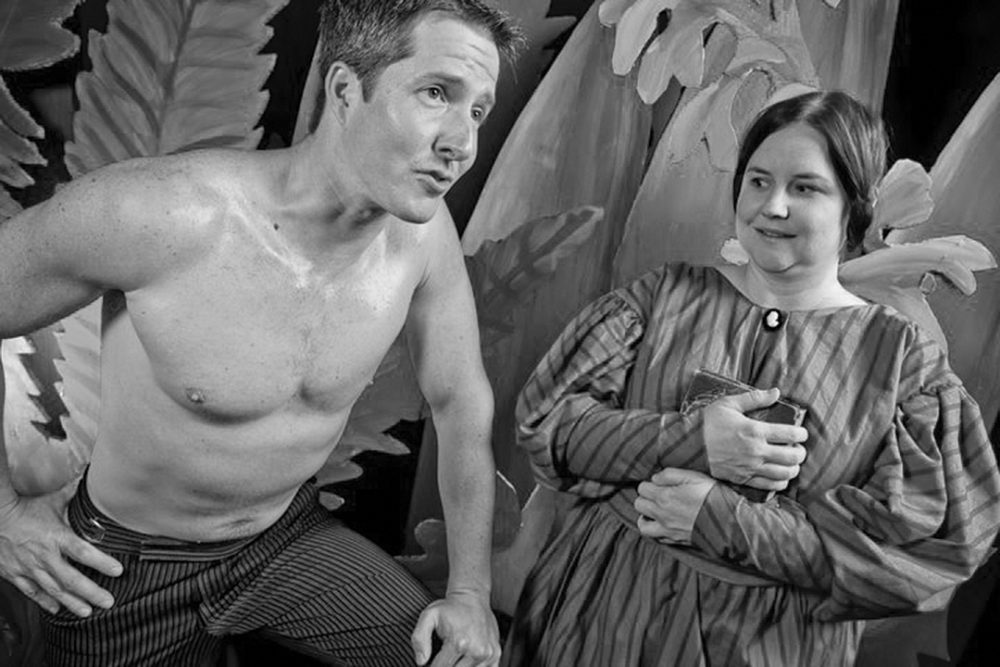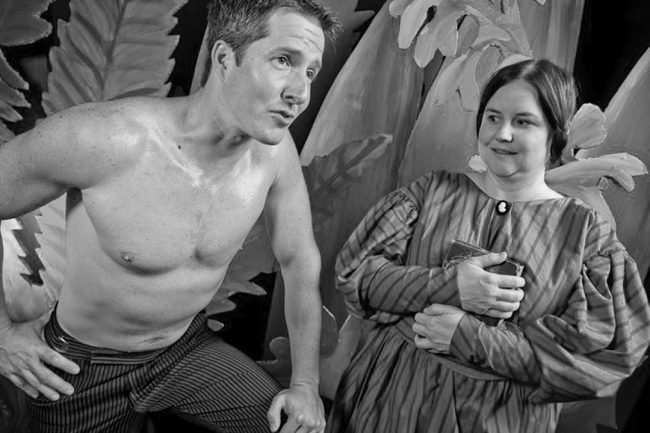
SMU alumni Chris Hury and Tina Parker star in “Charm” the latest show at Kitchen Dog Theater. (Provided by Kitchen Dog Theater)
Premiering for the first time in the southwest, multi-award winning playwright Kathleen Cahill’s “Charm” hits the stages of Dallas’ Kitchen Dog Theater.
The play, a comedic and touching look at the life of Margaret Fuller as she navigates through the frustrations of transcendental life along with other famous authors Nathaniel Hawthorne, Ralph Waldo Emerson, and Henry David Thoreau.
Kitchen Dog Theater, part of the McKinney Avenue Contemporary, hosts the show in its Heldt/ Hall theater. The theater, a quaint but fitting arena for “Charm,” adds much intimacy between the actors and their audience.
The play’s set derives much of its inspiration from the play’s view on nature, or better yet, the transcendental view on nature. With hulking dandelions as idea bulbs, giant blades of grass painted whimsically and a period-matched canopy bed that is home to some of the play’s most romantically frustrating scenes, the set is very versatile. However, this versatility is not used to its best in some scene transitions, resulting in an awkward pause between scenes that sometimes breaks the beautiful and fast pace “Charm” possesses.
Even though “Charm” is written for the literary fan, an audience member does not have to be an English major to understand the plot line. In all simplicity, “Charm” is about a woman desperately seeking to be loved, to be accepted for who she is and to be appreciated for the ideas she has. Although it may be a period piece, this plot line knows no time restraint.
As complicated as the play’s main character is, the role’s many layers and complexities would intimate any actor. However, lead actress Tina Parker tackles the role fearlessly, almost flawlessly, as well. Parker’s delivery is honest and you can tell that she relates to the struggles that Fuller faced and that connection brings this character to life.
However, what the play lacks in complexities, its makes up for in humor. With as many quirks as a new-age play, the transcendental period piece has a very modern sense of humor. “Charm’s” biggest laugh comes from the one-liners, and quick dialogue, that Parker shares with her supporting cast. Chalked full of lines that poke fun at the progressively puritan lifestyle that characters live, audience laughter was robust and sparsely muted.
A particularly funny aspect of “Charm” relates the foreign languages the characters sometimes utilize. For instance, in a scene featuring Fuller and her newly interested lover, Count O, the audience watches as the charming Count tries to seduce Ms. Fuller in Italian. To aid the audience, translation cards are being held up by the play’s comedic relief, Martha Harms. The phrases of Count O, which progressively become more and more graphic, ensue hilarity throughout Heldt Hall theater.
“Charm” also has a very dramatic and touching story line as well. Rather it be Fuller’s quest for companionship or her failed attempts at love with every man or woman that comes her way, “Charm” can sometimes tug at your heart’s strings.
As the play progresses, and the audience is clued into the infatuation that Schmidt’s Emerson holds for Margaret Fuller. Fuller’s chance at finding love is repetitively ruined by Emerson’s too serious demeanor. At one point in the play, I wanted to stand up and yell, “Just tell her you love her already!” However, my hopes that I carried for the two becoming a couple were always somehow ruined.
“Charm” as a whole is a triumphant piece of work that presents social issues and shortcomings that are still prevalent today. This relevance in theme keeps you interested to the very end and has you thinking about the play the next morning. With an ending that features Fuller stripped from her claustrophobic 19th century garb and into a liberating blue one-piece swimsuit with complimenting rainbow swimming cap, the final scene leaves a lasting impression of liberation and triumph as the show’s final note.
Running through Dec. 11, tickets range from $10-$25. Located in the heart of Dallas’ uptown, Kitchen Dog Theater’s production of “Charm,” is an enjoyable ‘dramedy’ worth seeing.













